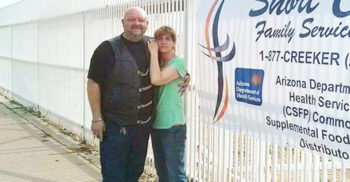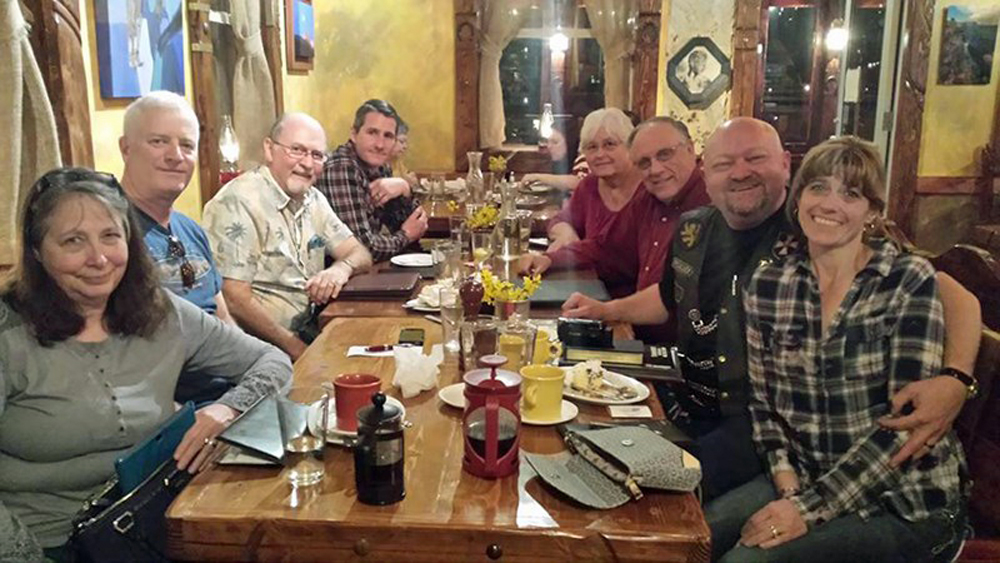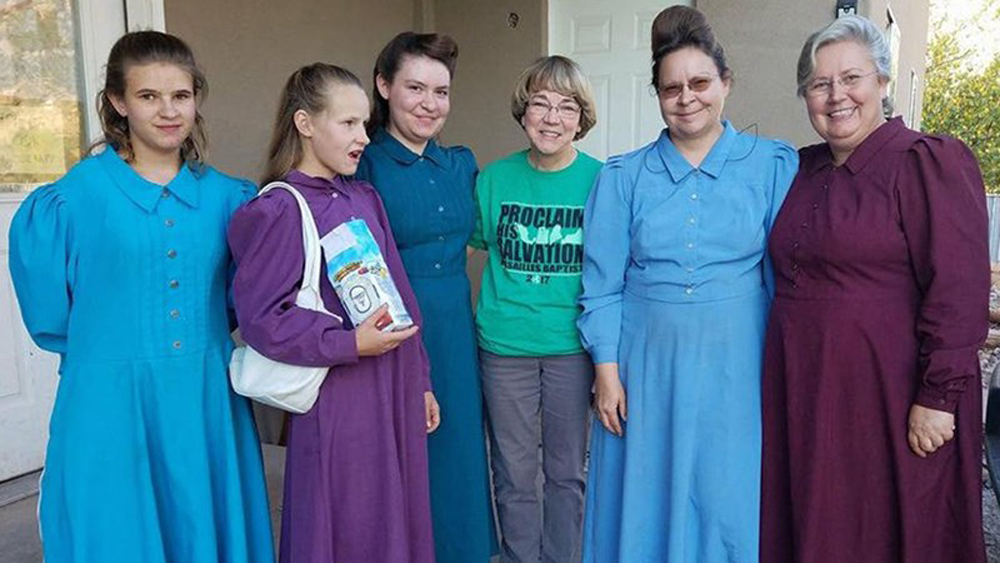By Grace Thornton —

Brian Mackert was the 28th child of a polygamist father with four wives and 31 children.
Family tumult in the Fundamentalist Church of Jesus Christ of Latter-day Saints (FLDS) prompted his mother to divorce — leaving Mackert an angry teenager, even wanting to kill his father.
Mackert didn’t feel he was one of the favored sons in the community, that “it didn’t matter how much I tried to please the elders, I wouldn’t be receiving a daughter of Zion as a wife.” Because each man in the fundamentalist Mormon church has to marry at least three women to achieve godhood, that meant statistically only one out of every four boys in the church was favored enough to make it.
So after several troubled years of drinking and doing drugs, Mackert left and ended up in the Navy, intending after his discharge to take a gun and kill his father on Father’s Day.
Fist-shaking to forgiveness
But before that fateful day came, a chaplain intervened. Mackert was put in psychiatric counseling and substance abuse treatment where he confessed all his plans.
“It helped me come to the realization that killing him wouldn’t make anything better, but I still hated him,” he said.
It would take joining the Marines next and spending a few more years cursing God and his father before Mackert began to figure out his life and his faith. He tried going to Mormon services, but still felt revulsion. When he got married and his wife said she couldn’t be a Mormon, he was relieved.
He considered becoming an atheist, but she asked him to try a Baptist church. So he did and after the message of Christ chipped away at his Mormon core, he surrendered his life to Jesus.
“I called my dad. We hadn’t spoken in 13 years,” Mackert said. “I talked to him and forgave him and asked him to forgive me for having judged him, because God hadn’t put me on earth to be his judge.”
That phone call didn’t change their relationship, but it did change Mackert. “It had everything to do with me letting go of the bitterness and the anger.”
And he found God slowly drawing him back to his former polygamist community to reach his people.
Fast forward more than a decade, and Mackert was sitting at a trustee meeting in Colorado City, Ariz., asking a panel of polygamists for a place to live.
“In the fundamentalist community, everybody has consecrated their property to the church, so you have to get permission to live there,” he said.
A lot had happened since Mackert had left the FLDS church. He had found Jesus. He had walked through dark periods of the soul. He had married, then his marriage ended. He had led a fruitful prison ministry and been licensed as a Baptist minister. He had penned a book about God rescuing him from his fundamentalist upbringing, a life in which the Mackerts had grown up alongside the infamous Jeffs family.
None of that was a secret, and the panel was puzzled as to why he would ever come back. They waited for his answer.
He could’ve just told them he wanted to be close to his aging mother — still a fundamentalist Mormon — so that he could care for her. But he heard different words coming out of his mouth instead.
“God’s called me to move back and plant a church here.”
The words hung in the silence for a moment, and then a trustee said, “Well, good. We need diversity in this community.”
Mackert was speechless but was ready to go. With an open door into the community and support from First Southern Baptist Church in Hurricane, Utah, he moved in and began building bridges.
Around the same time, he had fallen in love with Sherrie Kuns, a woman with a social work background who had spent 28 years ministering to human trafficking victims.
“It was amazing that God would bring me someone with trauma counseling skills,” Mackert said. “I knew we were going to need that to handle the issues in the community.”
They married, and a week after the wedding the FBI raided the FLDS community on charges of food stamp fraud.
“The leaders were charged with embezzling $12 million from the welfare system, so all those benefits were frozen for their families,” Mackert said.
For a community of mostly women and children with a 70 percent unemployment rate and a 90 percent poverty rate, “it was basically a humanitarian crisis,” he said. “People were starving.”
The Short Creek Community along the Arizona-Utah border — stretching from about 20 miles south of Colorado City to about 20 miles north — had about 10,000 people, many in polygamist families, impoverished and hungry.
So Mackert did the best thing he could think of — he got food and stocked a 10,000-square-foot warehouse. In July 2016, Short Creek Family Services did its first food distribution feeding more than 100 families. Now, more than a year later, they’re distributing 24 tons of food per month to feed 1,000 families.

“It’s giving us a golden reputation in the community,” Mackert said. “People are beginning to see that we just want to help them, that we don’t want to control them or take from them. They need to experience our love before they respect what we have to say.”
After Mackert and his wife moved to Colorado City, their front door was kicked in more than once, a rock was thrown through their ministry window, their signs were vandalized and their motorcycle tampered with.
“The spiritual attack has been vicious, but we won’t quit,” Mackert said.
And over time, as people have visited the food bank, they’ve become friends of the Mackerts and have begun to trust them as community leaders.
“People will sometimes come out of their way to find me and say, ‘Brian, can I talk to you?’ And we would go in my office and they would pour out their pain, and I would pray with them over it,” Mackert said. “People are starting to come to me with questions.”
One day in the middle of the grocery store, someone stopped Mackert and said his son had begun to read the Bible and was wondering if he was going to hell.
“We talked about it right there in the middle of the grocery store with people around, and I told him to go read John 3,” Mackert said. “We stood right there and talked about Jesus’ conversation with Nicodemus.”
It was the first whispers of a church now called Short Creek Fellowship.
And other things are happening as well. They’ve purchased a house that will serve as lodging for missions teams who come in the future. They fill the seats at their dinner table with those who can’t afford to eat or who just need a friend. They’re doing a Christmas shoe drive for people so desperate for shoes that they cut the toes out of the ones they have to make them fit longer.
And Mackert is ministering to the “lost boys” of the FLDS — boys like him who didn’t fit and got left behind.
Rob Lee, executive director of the Utah-Idaho Southern Baptist Convention, said he’s grateful for Mackert and the churches in southern Utah that are partnering to meet the needs of the FLDS/polygamist community.

“Brian’s experience growing up in a polygamist family uniquely equips him to share the Gospel. His story shows that God can reach those even in a polygamist lifestyle with the saving Gospel,” Lee said. “God has opened so many doors so quickly. Having Brian there ministering is an incredible blessing and a support for a number of ministries serving the FLDS community.”
Mackert said he’s just grateful to be a part of what God’s doing in the midst of the ashes of his growing-up years.
“I’ve never in my life experienced so much conflict, but I’ve never in my life had so much peace and joy,” he said.– Baptist Press
If you want to know more about a personal relationship with God, go here
Mackert’s ministry welcomes missions teams to Colorado City. For more information, visit shortcreekfellowship.org.




Comments are closed.